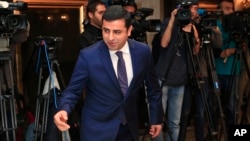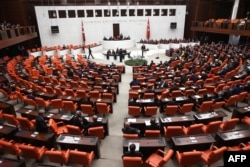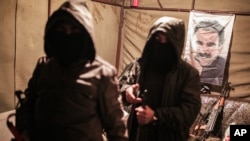Turkish prosecutors have launched an investigation into Selahattin Demirtas, the leader of Turkey’s main pro-Kurdish party. The move comes as security forces continue a crackdown across the predominantly Kurdish southeast against supporters of the banned Kurdistan Workers Party, the PKK.
The leader of the Peoples' Democratic Party, or HDP, is under investigation for calling for autonomy for Turkey’s Kurdish minority. The move follows Prime Minister Ahmet Davutoglu cancelling a meeting with Selahattin Demirtas, accusing him and his party of political immaturity.
Political scientist Cengiz Aktar of Istanbul’s Suleyman Sah University warns history could be repeating itself in Turkey.
"In the '90’s DEP, the first ever Kurdish Party to make it to the parliament under the banner of the Social Democrats, and they had been completely ostracized in the parliament and they were arrested and taken by force from parliament and jailed and we may see the repetition of this," he said.
The HDP came into parliament after winning just over 10 percent of the vote in the November election.
The legal and political moves against the HDP coincide with Turkish security forces' continuing crackdown on the Kurdish rebel group the PKK. Parts of the southeastern region is under a strict curfew, tanks patrol in several towns, backed by thousands of soldiers and police officers. Local human rights groups say more than 100 civilians, including some children, have been killed.
A Kurdish group called TAK says the crackdown prompted it to launch a deadly mortar attack last week on Istanbul’s second international airport Sabiha Gokcen. Security analyst Metehan Demir says if TAK is involved it would be a concern.
"It's worrying because it means such attacks might continue. But normally if you look at recent attacks of the PKK, you don't see attacks against civilian society, and we should wait for a while to understand attack fully," he said.
The PKK claims it has no control over TAK, which Turkish authorities reject. TAK has in the past carried out several attacks against civilian targets. Analyst Demir says with hawks on both sides on the ascendancy, there appears little chance of a return to the peace efforts that collapsed in July.
"From both sides there were casualties, unfortunately the psychology on both sides the Turkish security forces and PKK side they cannot get together again to discuss the [peace] solution again," said Demir.
Both sides appear to be hardening their positions, with the Kurdish rebel leadership declaring that it faces a full scale war, while Turkey’s political leadership has ruled out any end to the crackdown until the PKK has disarmed.






